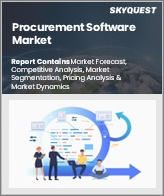
|
시장보고서
상품코드
1734430
조달 소프트웨어 시장 규모, 점유율, 성장 분석, 전개 형태별, 소프트웨어 유형별, 조직 규모별, 업계별, 지역별 - 산업 예측(2025-2032년)Procurement Software Market Size, Share, and Growth Analysis, By Deployment (On-cloud, On-premise), By Software Type (Supplier Management, Contract Management), By Organization Size, By Vertical, By Region - Industry Forecast 2025-2032 |
||||||
조달 소프트웨어 세계 시장 규모는 2023년 76억 달러, 2024년 84억 2,000만 달러에서 2032년에는 191억 3,000만 달러로 성장하고, 예측 기간(2025-2032년)의 CAGR은 10.8%를 나타낼 전망입니다.
각 산업 분야에서 빠르게 진행되고 있는 디지털화가 세계 조달 소프트웨어 시장의 성장을 크게 견인하고 있습니다. 기업들은 수작업에서 자동화된 전자 조달 시스템으로 전환하여 인적 오류를 최소화하면서 업무 효율성을 높이고 비용을 절감하고 있습니다. 이러한 전환은 조달, 공급업체 관리 및 계약 처리의 중앙 집중화를 통해 조달 가시성 향상과 전략적 의사결정을 촉진합니다. 또한, 클라우드 기반 구축이 매우 중요한 트렌드로 떠오르고 있으며, 기업은 원격으로 조달 시스템에 접근할 수 있어 실시간 협업을 촉진하고 대규모 On-Premise 인프라가 필요 없게 됩니다. 이러한 유연성은 복잡한 공급망을 운영하는 다국적 기업에게 특히 유리합니다. 민첩성, 비용 효율성, 디지털 접근성이 강조되는 가운데, 조달 소프트웨어와 클라우드 기술의 통합은 시장 확대와 경쟁력 강화에 필수적입니다.
목차
서론
- 조사 목적
- 조사 범위
- 정의
조사 방법
- 정보 조달
- 2차와 1차 데이터 방법
- 시장 규모 예측
- 시장 전제조건과 제한
주요 요약
- 세계 시장 전망
- 공급과 수요 동향 분석
- 부문별 기회 분석
시장 역학과 전망
- 시장 개요
- 시장 규모
- 시장 역학
- 성장 촉진요인과 기회
- 성장 억제요인과 과제
- Porter의 Five Forces 분석
주요 시장 인사이트
- 중요 성공 요인
- 경쟁 정도
- 주요 투자 기회
- 시장 생태계
- 시장의 매력 지수(2024년)
- PESTEL 분석
- 거시경제 지표
- 밸류체인 분석
- 가격 분석
- 사례 연구
조달 소프트웨어 시장 규모 : 전개 형태별&CAGR(2025-2032)
- 시장 개요
- On-Cloud
- On-Premise
조달 소프트웨어 시장 규모 : 소프트웨어 유형별&CAGR(2025-2032)
- 시장 개요
- 공급업체 관리
- 계약 관리
- E-procurement
- E-sourcing
- 지출 분석
조달 소프트웨어 시장 규모 : 조직 규모별&CAGR(2025-2032)
- 시장 개요
- 중소기업(SME)
- 대기업
조달 소프트웨어 시장 규모 : 업계별&CAGR(2025-2032)
- 시장 개요
- 여행 및 물류
- IT 및 통신
- 일렉트로닉스
- 자동차
- 소매
- 광업
- 기타
조달 소프트웨어 시장 규모 : 지역별&CAGR(2025-2032)
- 북미
- 미국
- 캐나다
- 유럽
- 독일
- 스페인
- 프랑스
- 영국
- 이탈리아
- 기타 유럽
- 아시아태평양
- 중국
- 인도
- 일본
- 한국
- 기타 아시아태평양
- 라틴아메리카
- 브라질
- 기타 라틴아메리카
- 중동 및 아프리카
- GCC 국가
- 남아프리카공화국
- 기타 중동 및 아프리카
경쟁 정보
- 주요 5개사 비교
- 주요 기업의 시장 포지셔닝(2024년)
- 주요 시장 기업이 채택한 전략
- 최근 시장 동향
- 기업의 시장 점유율 분석(2024년)
- 주요 기업 개요
- 기업 상세
- 제품 포트폴리오 분석
- 기업 부문별 점유율 분석
- 매출 전년대비 비교(2022-2024년)
주요 기업 개요
- Basware Corp.
- BirchStreet Systems Inc.
- Enaviya Information Technology Pvt. Ltd.
- Ginni Systems Ltd.
- International Business Machines Corp.
- Ivalua Inc.
- Microsoft Corp.
- NB Ventures Inc.
- Oracle Corp.
- ORO Labs Inc.
- SAP SE
- ScienceSoft USA Corp.
- SunSmart Technologies Pvt. Ltd.
- SutiSoft Inc.
- Tata Consultancy Services Ltd.
- Tropic Technologies Inc.
- Workday Inc.
- Zycus Inc.
결론과 제안
LSH 25.06.11Global Procurement Software Market size was valued at USD 7.6 billion in 2023 and is poised to grow from USD 8.42 billion in 2024 to USD 19.13 billion by 2032, growing at a CAGR of 10.8% during the forecast period (2025-2032).
The rapid digitalization across industries significantly propels the growth of the global procurement software market. Companies are shifting from manual to automated electronic procurement systems, enhancing operational efficiency and reducing costs while minimizing human error. This transition fosters improved procurement visibility and strategic decision-making through centralized sourcing, supplier management, and contract handling. Furthermore, cloud-based deployment emerges as a pivotal trend, allowing organizations to access procurement systems remotely, facilitating real-time collaboration, and obviating the need for extensive on-premises infrastructure. This flexibility is particularly advantageous for multinational firms navigating complex supply chains. With heightened emphasis on agility, cost-effectiveness, and digital accessibility, the integration of procurement software with cloud technology is essential for market expansion and competitiveness.
Top-down and bottom-up approaches were used to estimate and validate the size of the Global Procurement Software market and to estimate the size of various other dependent submarkets. The research methodology used to estimate the market size includes the following details: The key players in the market were identified through secondary research, and their market shares in the respective regions were determined through primary and secondary research. This entire procedure includes the study of the annual and financial reports of the top market players and extensive interviews for key insights from industry leaders such as CEOs, VPs, directors, and marketing executives. All percentage shares split, and breakdowns were determined using secondary sources and verified through Primary sources. All possible parameters that affect the markets covered in this research study have been accounted for, viewed in extensive detail, verified through primary research, and analyzed to get the final quantitative and qualitative data.
Global Procurement Software Market Segments Analysis
Global Procurement Software Market is segmented by Deployment, Software Type, Organization Size, Vertical and region. Based on Deployment, the market is segmented into On-cloud and On-premise. Based on Software Type, the market is segmented into Supplier Management, Contract Management, E-procurement, E-sourcing and Spend Analysis. Based on Organization Size, the market is segmented into Small and medium size Enterprises (SME) and Large Enterprises. Based on Vertical, the market is segmented into Travel & Logistics, IT & Telecommunications, Electronics, Automotive, Retail, Mining and Others. Based on region, the market is segmented into North America, Europe, Asia Pacific, Latin America and Middle East & Africa.
Driver of the Global Procurement Software Market
A significant factor propelling the growth of the global procurement software market is the ongoing digital transformation within organizations. Companies are increasingly adopting automated procurement solutions to boost operational efficiency, reduce reliance on manual processes, and improve decision-making capabilities. This shift enables better data management, enhances transparency, and optimizes supply chain management. Consequently, these advancements not only streamline procurement operations but also contribute to the overall expansion of the market, as businesses recognize the value of modernizing their procurement practices to remain competitive in an evolving landscape.
Restraints in the Global Procurement Software Market
A significant constraint affecting the global procurement software market is the substantial initial implementation costs associated with these advanced solutions. This financial barrier poses challenges, particularly for small and medium-sized enterprises (SMEs), which often find it difficult to afford the upfront investment required for adopting such systems. As a result, many SMEs may hesitate to integrate procurement software into their operations, limiting their ability to leverage advanced technology for improving efficiency and productivity. The high costs associated with implementation can thus hinder broader market growth, as a considerable segment of potential users remains underserved.
Market Trends of the Global Procurement Software Market
The Global Procurement Software market is witnessing a significant trend toward the rise of AI-driven solutions, transforming traditional procurement practices. The integration of artificial intelligence enhances the capabilities of procurement software by enabling automation, predictive analytics, and improved decision-making processes. Companies are increasingly adopting these advanced technologies to optimize sourcing strategies, streamline supplier management, and effectively reduce procurement costs. As organizations seek greater efficiency and accuracy in their procurement operations, the demand for intelligent software solutions is expected to surge, driving innovation and shaping the future landscape of the procurement industry globally.
Table of Contents
Introduction
- Objectives of the Study
- Scope of the Report
- Definitions
Research Methodology
- Information Procurement
- Secondary & Primary Data Methods
- Market Size Estimation
- Market Assumptions & Limitations
Executive Summary
- Global Market Outlook
- Supply & Demand Trend Analysis
- Segmental Opportunity Analysis
Market Dynamics & Outlook
- Market Overview
- Market Size
- Market Dynamics
- Drivers & Opportunities
- Restraints & Challenges
- Porters Analysis
- Competitive rivalry
- Threat of substitute
- Bargaining power of buyers
- Threat of new entrants
- Bargaining power of suppliers
Key Market Insights
- Key Success Factors
- Degree of Competition
- Top Investment Pockets
- Market Ecosystem
- Market Attractiveness Index, 2024
- PESTEL Analysis
- Macro-Economic Indicators
- Value Chain Analysis
- Pricing Analysis
- Case Studies
Global Procurement Software Market Size by Deployment & CAGR (2025-2032)
- Market Overview
- On-cloud
- On-premise
Global Procurement Software Market Size by Software Type & CAGR (2025-2032)
- Market Overview
- Supplier Management
- Contract Management
- E-procurement
- E-sourcing
- Spend Analysis
Global Procurement Software Market Size by Organization Size & CAGR (2025-2032)
- Market Overview
- Small and medium size Enterprises (SME)
- Large Enterprises
Global Procurement Software Market Size by Vertical & CAGR (2025-2032)
- Market Overview
- Travel & Logistics
- IT & Telecommunications
- Electronics
- Automotive
- Retail
- Mining
- Others
Global Procurement Software Market Size & CAGR (2025-2032)
- North America (Deployment, Software Type, Organization Size, Vertical)
- US
- Canada
- Europe (Deployment, Software Type, Organization Size, Vertical)
- Germany
- Spain
- France
- UK
- Italy
- Rest of Europe
- Asia Pacific (Deployment, Software Type, Organization Size, Vertical)
- China
- India
- Japan
- South Korea
- Rest of Asia-Pacific
- Latin America (Deployment, Software Type, Organization Size, Vertical)
- Brazil
- Rest of Latin America
- Middle East & Africa (Deployment, Software Type, Organization Size, Vertical)
- GCC Countries
- South Africa
- Rest of Middle East & Africa
Competitive Intelligence
- Top 5 Player Comparison
- Market Positioning of Key Players, 2024
- Strategies Adopted by Key Market Players
- Recent Developments in the Market
- Company Market Share Analysis, 2024
- Company Profiles of All Key Players
- Company Details
- Product Portfolio Analysis
- Company's Segmental Share Analysis
- Revenue Y-O-Y Comparison (2022-2024)
Key Company Profiles
- Basware Corp.
- Company Overview
- Business Segment Overview
- Financial Updates
- Key Developments
- BirchStreet Systems Inc.
- Company Overview
- Business Segment Overview
- Financial Updates
- Key Developments
- Enaviya Information Technology Pvt. Ltd.
- Company Overview
- Business Segment Overview
- Financial Updates
- Key Developments
- Ginni Systems Ltd.
- Company Overview
- Business Segment Overview
- Financial Updates
- Key Developments
- International Business Machines Corp.
- Company Overview
- Business Segment Overview
- Financial Updates
- Key Developments
- Ivalua Inc.
- Company Overview
- Business Segment Overview
- Financial Updates
- Key Developments
- Microsoft Corp.
- Company Overview
- Business Segment Overview
- Financial Updates
- Key Developments
- NB Ventures Inc.
- Company Overview
- Business Segment Overview
- Financial Updates
- Key Developments
- Oracle Corp.
- Company Overview
- Business Segment Overview
- Financial Updates
- Key Developments
- ORO Labs Inc.
- Company Overview
- Business Segment Overview
- Financial Updates
- Key Developments
- SAP SE
- Company Overview
- Business Segment Overview
- Financial Updates
- Key Developments
- ScienceSoft USA Corp.
- Company Overview
- Business Segment Overview
- Financial Updates
- Key Developments
- SunSmart Technologies Pvt. Ltd.
- Company Overview
- Business Segment Overview
- Financial Updates
- Key Developments
- SutiSoft Inc.
- Company Overview
- Business Segment Overview
- Financial Updates
- Key Developments
- Tata Consultancy Services Ltd.
- Company Overview
- Business Segment Overview
- Financial Updates
- Key Developments
- Tropic Technologies Inc.
- Company Overview
- Business Segment Overview
- Financial Updates
- Key Developments
- Workday Inc.
- Company Overview
- Business Segment Overview
- Financial Updates
- Key Developments
- Zycus Inc.
- Company Overview
- Business Segment Overview
- Financial Updates
- Key Developments



















